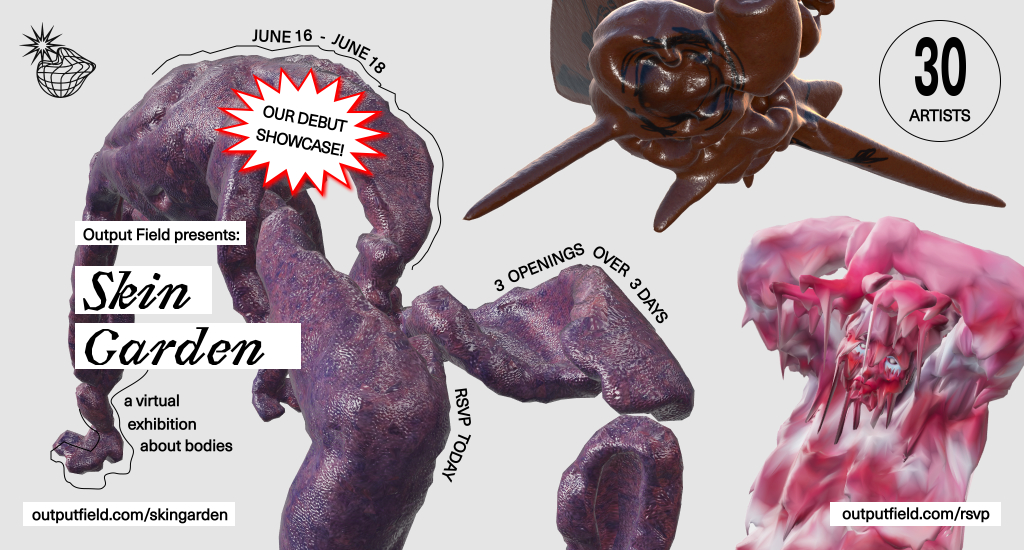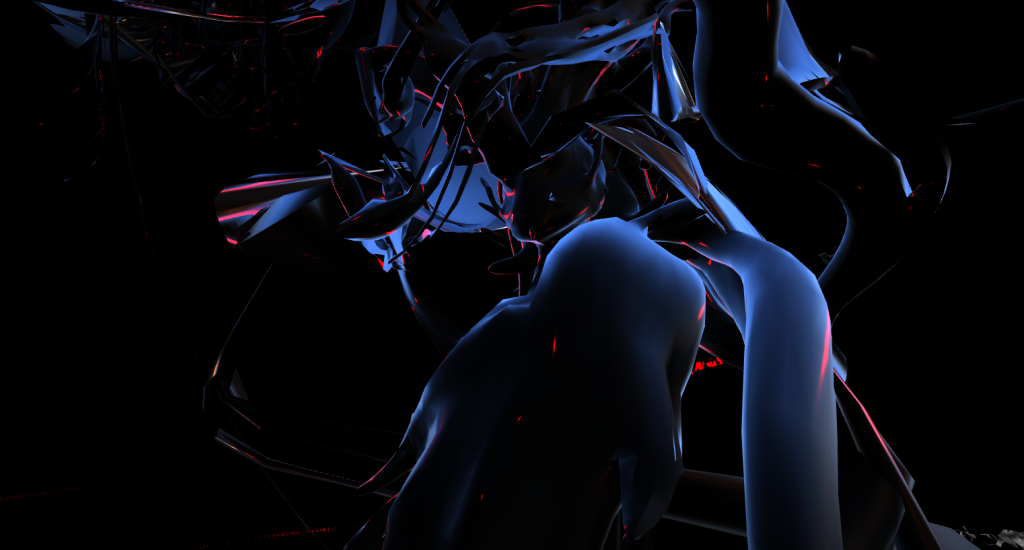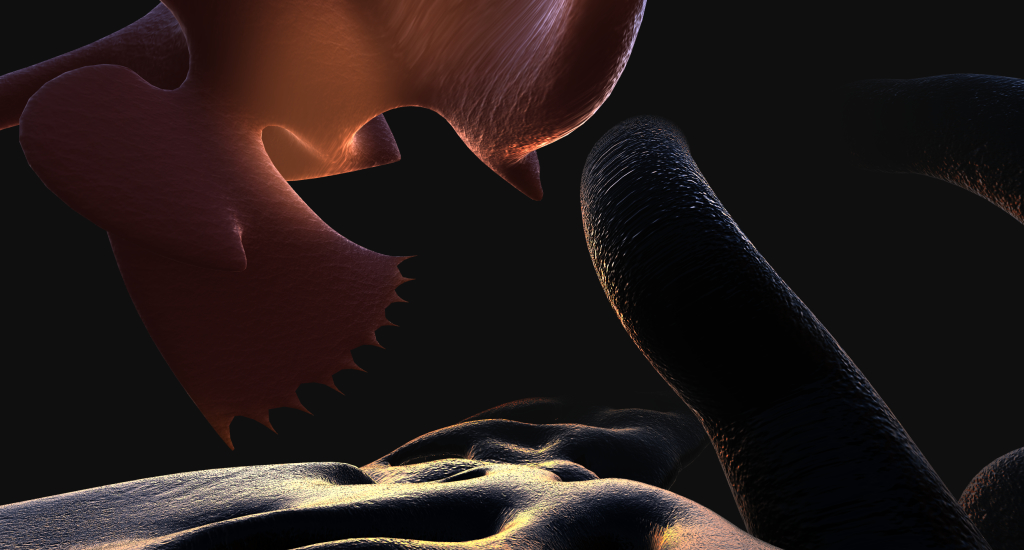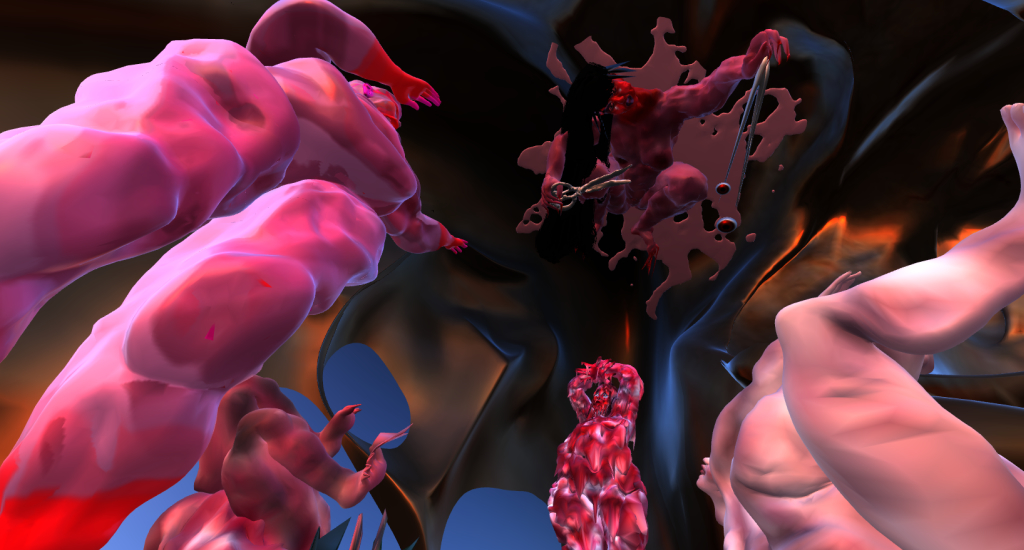Text by Griffin Martell

Bodies are complex. From the moment of birth, we become immediately acquainted with our corporeal selves through the very moment of sensation. To be conscious is to inhabit a body. Yet, over time, through biological and social development, our relationship with our bodies gradually transforms.
We move from a stage of material immediacy to various stages of abstraction and conceptualisation. We see other bodies; we learn to idealise some forms and criticise others. We are told to “love the skin you’re in” or “treat your body like a temple”, but these declarations of supposed self-love contain insidious sub-texts: why only love our own skin? Why not love the skin of others? Is our own body only worthy of reverence? Should we not treat all bodies as temples?
These questions provide a context for Skin Garden, the debut virtual showcase from the new experimental arts non-profit Output Field. By way of audiovisual reflection, Skin Garden looks to investigate bodies and flesh with particular regard for topics surrounding trauma, queerness, semiotics, subjectivity and plurality. The exhibition will take place over the course of three days (Jun. 16 -18) in three different virtual gallery spaces hosted by New Art City.
The programming for Skin Garden spans digital art, music and critical theory. The Output Field team has carefully selected all of the presenters to showcase queer and/or femme-identifying artists, alongside other underrepresented voices in new media arts, as part of the organisation’s overarching mission to “redistribute clout.”
When asked further about this goal and what is meant by “clout,” founder Viv Qiu remarks that clout is an interesting thing; you know it when you see it. You probably have clout if fans of your work have a nickname like ‘Beliebers’ or ‘Hegelians.’ She goes on to explain two important markers that indicate when an artist can be viewed as possessing ‘clout’: you’re seen as a benchmark that people in your field compare work to, and when the resources important to your practice come to find you, rather than you working to reach them.
In this sense, one can think of “clout” as a form of social currency circulating within the creative industries. As Output Field sees it, the issue with this currency is that it is not always distributed based on merit alone. Attaining a certain level of influence, recognition, and access is often due to a magical cocktail of luck and privilege, and there remains a whole trove of artists who can’t attain that same level due to systemic barriers and discrimination, not lack of artistic merit. As Viv explains, these are the artists that Output Field is interested in: We’re committed to amplifying anyone who makes us say damn, more people need to see this.




Following its initial soft opening in March, Skin Garden marks Output Field’s formal entrance as a curatorial platform connecting artists across disciplines. Taking inspiration from arts writer and historian Maura Reilly, specifically her book Curatorial Activism: Towards an Ethics of Curating, Output Field has adopted a relational, collaborative and counter-hegemonic approach to arts curation with Skin Garden.
This manifests itself in the pluralistic scope of body representation on display within the various exhibits. Skin Garden operates on the premise that there is no stable, absolute form constitutive of a human body, or, as Viv succinctly puts it: look at all the things a body can be.
With each successive day of the exhibition, new exhibits or ‘rooms’ exploring various aspects of flesh and bodies will be unlocked. On day one, THE LOBBY will open with a housewarming party over Zoom, featuring DJ sets from Canadian club music experimentalists Online Threat, SOFTMATTER and Venus In Foil, along with memory worker and noise-maker ASH-ANTI.
In addition to acting as a home-base where all three rooms can be accessed, THE LOBBY will house sounds contributed by Tooba Greer Williams, a hyper-improvisational musical project developed by the NYC-based multimedia artist Candice Saint Williams, alongside 3D-rendered sculptures designed by digital artist Kushagra.
Also opening on day one is WALK-INS WELCOME, a digital tattoo showroom wherein CG artists Lady Bamb and Nusi Quero present sculptures adorned with the tattoo designs of Hyodomachine Lv Dian, Pang, and Heavenly Beauty Tattoo. Here, body modification and the art of tattooing is explored through a digital medium, introducing innovative, future-facing trajectories of the ancient practice.
Day 2 is themed around the title BODIES UNHINGE. In a virtual space theorised by Venus In Foil, Musician Betty Apple and digital art studio IOR50 will use breath, movement and voice to articulate queer affect. A panel discussion will follow this and Q+A with the gallery curators, providing deeper insight into the mechanisms of ‘queering’ sound and movement.
BODIES UNHINGE segues into the third and final day, RECONSIDER FLESH, where the ‘garden’ concept behind the exhibition blooms into full view with a landscape of breathing sculptures designed by a wide selection of multimedia artists including Salomé Chatriot, Bella Baguena, BORA, and many more. The ideas behind this space will be contextualised through a broadcast of three different literature and theory readings that discuss bodies:
Gordon Hall’s critique of exclusionary language regarding bodies, “Why I Don’t Talk About ‘The Body,’” Gilles Deleuze and Felix Guattari’s notoriously abstruse and beguiling work of philosophical-prose “How do you make yourself a body without organs?” and Bob Flanagan’s radically visceral poem “Why.”
Skin Garden is an ambitious and all-embracing undertaking for a premiere exhibition, but Output Field’s curatorial rigour and strong theoretical vision warrant a grand entrance. Founder Viv Qiu notes that the pluralistic approach adopted with Skin Garden is how Output Field hopes to grow as an organisation. She explains that as an organisation, we are wary of the single genius model that usually dictates the development of an exhibition.
Each room of this exhibition was formed through discourse, not demands. It’s evident that inclusivity, collectivity and intentionality make up the core values of Output Field’s curatorial approach with Skin Garden*. In a contemporary art landscape afflicted by gatekeeping mentalities, it’s truly a beautiful sight to behold.






